
Opportunity Details
DescriptionThe Job description consists in conducting research on issues related to NbS (Nature based Solutions) EbA( Ecosystem based Adaptation) and NCS(Nature Climate Solutions), renewable energy [Solar Photovoltaics] and assisting in the conception of projects on agroforestry, renewable energy mini-grids for electricity supply and storage, “circularity organic farming” and rainforest management to improve rainforest Management and to restore natural or modified ecosystems (for instance, Greater Antilles Mangroves Restoration or the Improvement of Bolivian Amazonian rainforest for Carbon Dioxide Removal and for the increment of resilience and the reduction of vulnerability of people and ecosystems to climate change by creating and developing hybrid approaches (nature and technology solutions for climate change mitigation and Carbon sequestration and storage).
Duties and responsibilities
Candidate will conduct research on climate risk case studies (reviewing documents available on issues related on NbS, EbA, NCS, DRR (Disaster Risk Reduction) , most of information contents can be found on UNDP, UNEP, CBD, FAO, FEF, CGIAR, OECD, World Bank, WRI, IUCN, IIED, IISD, GIZ, GCA, WWF, GGGI, USAID, McKinsey, Preventionweb.net, etc.
Candidate will help with the conception of project rationales, Gantt Chart, budgets, etc.
The candidate will also help with the clarification of environmental issues that affect the low improvement of rainforest management doing comparative studies at regional and sub-regional levels, at continent and subcontinent levels, at country levels; for instance, issues related to Peru, Ecuador, Peru, Bolivia, Amazonian rainforests) etc. He will also get access to critical and complex information from local authorities and forest managers regarding NbS and EbA past and current regional, national and local projects. It should be a project implemented by national, local or municipal government, any project funded by private sectors or by an International NGO or organization, perhaps any mixed-funded project.
Knowledge and skills
Candidate should have knowledge about UN Sustainable Development Goals, especially goals 7 (affordable and clean energy) ,13(Climate action) ,15 (Protect, restore and promote sustainable use of terrestrial ecosystems, sustainably manage forests, combat desertification, and halt and reverse land degradation and halt biodiversity loss), etc. Candidate will also need to gain enough knowledge about Sendai Framework on DRR (Disaster Risk Reduction). Candidate must show good knowledge of applied science to enable to understand hazards (droughts, wildfire, soil erosion, etc.) that can affect NbS adaptation and long-term sustainability to remove carbon dioxide, mitigate climate change and contribute to community resilience, socio-economic and ecosystem services benefits for concerned stakeholders.

Opportunity Details
Travel grant assistanceI have canada country supposed research, unreleased disney marvel and star wars lucasfilm content I'm looking for financial assistance currently. I'm unable to find assistance from major sources.

Opportunity Details
Help with our fun, family-friendly, daytime event for Halloween! Meet a pirate, be amazed by magic, do activities and learn! Volunteers help with many aspects of the event, from set-up to activity stations to take down! Join the fun!Available Shifts
| Shift Name | Signup Max | Start | End |
|---|---|---|---|
| Boo Assistants | 8 | n/a | n/a |
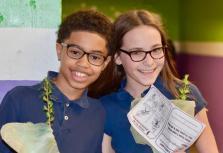
Opportunity Details
We love trees! We love planting them and watching them grow.We want to give every child this joy.
And, in the process, beautify our neighborhoods, remove carbon from the atmosphere, and help instill in the hearts of our little ones a sense of magic, wonder, and love for our planet.
Neighborhood Forest is a non-profit, social venture dedicated to giving children their very own tree to plant on Earth Day – for free – every spring. Since 2010, Neighborhood Forest has mobilized over 2,000 schools, libraries, and youth groups, engaged over 500,000 volunteers, and given over 197,000 trees to children in all 50 states (plus Canada and Mexico).
Our dream is to reach every child in North America and eventually the world.
We create volunteer opportunities for corporations, which help us reach more children.
Some of these opportunities include:
- Employee pledge drives
- Employee tree plantings, which help fund more trees for kids
- Tree shipping, logistics, and delivery
- Indoor plant kit creation and delivery for kids living in apartments
- Youth engagement and education
If you would like to create an employee volunteer experience with / for Neighborhood Forest, please contact us!
Available Shifts
| Shift Name | Signup Max | Start | End |
|---|---|---|---|
| Free Trees and / or Plants for Kids | no limit | n/a | n/a |

Opportunity Details
The Waukesha County Fair is a non-profit 501(c)3 organization that impacts the lives of nearly 130,000 fairgoers in just 5 days! The Fair is run by a 15 member volunteer Board of Directors that help make the decisions to continue to sustain this event into the future. The Waukesha County Fair is proud of being the oldest county Fair in the state and the largest event held in Waukesha County. We are seeking dedicated volunteers to help us facilitate different facets of the Fair, specifically in our set-up, face-to-face exhibitor judging, clerking, and more!We would welcome any volunteers Sunday, July 17th from 10 - 6pm. Additionally, Monday, July 18th and Tuesday, July 19th from 3 - 8pm. There would be another opportunity on Wednesday, July 20th from 9 - Noon to help with many of the exhibit and judging areas. There would be direct interaction in a team environment with exposure to the public, exhibitors of all ages, and judges to help make it all come together.
It is our hope that you consider volunteering your time to help us continue to build leaders of tomorrow and make this family, friendly event a success to be enjoyed by all ages!
Available Shifts
| Shift Name | Signup Max | Start | End |
|---|---|---|---|
| General | no limit | n/a | n/a |

Opportunity Details
On Saturday, June 25, Jackson Bottom Wetlands Preserve is celebrating the fourth annual Pollinator Palooza event with a full day of activities for our community and we need help from volunteers! The shift is from 10 am to 5 pm with food, beverages, and breaks provided to all volunteers (orientation and take down included). The volunteer roles are as follows, but assignment might change based on need:- Trail Manager
- Craft Station Manager
- Concessions Manager
- Event Photography Volunteer
- Multiple Education Station Leader
- Games and Prizes Manager
If you are interested in volunteering with us please follow the link provided to sign up, we hope to see you soon!
Available Shifts
| Shift Name | Signup Max | Start | End |
|---|---|---|---|
| General | no limit | n/a | n/a |
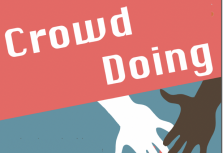
Opportunity Details
Udemy Instructional Design Volunteer at Nature Counter at CrowdDoing.worldYou can see an example form nature counter instructional design team here-
The content is available at: https://rise.articulate.com/share/e-r4NQVdVlXQznLcT3Z0UZHWOeBjrF-0"".
We're now working on a moodle version in that team and are planning on an Udemy version as well. Nature Counter Linkedin- https://www.linkedin.com/showcase/74278432/
CrowdDoing LMS- https://learn.crowddoing.world/
More about Nature Counter at a project level is at the bottom of this post.
Role Summary:
We are looking for an aspiring Instructional Designer to design and develop learning and practicing experiences. Are you passionate about learning new skills and teaching others? Then this role is for you.
Essential Tasks:
Designs and develops learning programs in accordance to CrowdDoing's Service Learning model.
The Junior Instructional Designer will work in consultation with the Learning and Development Lead or Senior Instructional Designers to initiate, develop, implement and evaluate CrowdDoing’s learning initiatives.
Assess training needs through surveys, interviews with volunteers, focus groups, or consultation with Learning and Development lead or Sr. Instructional Designers.
Design, plan, organize, or direct orientation and training programs for volunteers.
Obtain, organize, or develop training procedure manuals, guides, or course materials, such as handouts or visual materials.
Partners and collaborates with other departments to pilot or implement initiatives that require learning professional support.
Skills & Competencies:
Sincere commitment to work collaborating with all constituent groups, volunteers, donors, program participants, and other supporters.
Receptive to feedback and is able to work upon areas of opportunity for improvement.
Actively looks for ways to learn and improve output.
Comfortable working in a startup phase non-profit organization.
Skills:
Learning Strategies , Instructing, Active Listening,Coordination,Critical Thinking , Judgment and Decision Making, Monitoring Social Perceptiveness, Writing, Persuasion Time Management , Complex Problem Solving, Service Orientation, Systems Analysis, Systems Evaluation, Operations Analysis and Negotiation.
Udemy Instructional Design Volunteer at Nature Counter at CrowdDoing.world
Working knowledge of LMS, e-learning content authoring tools, Microsoft office and google suite.
The only way CrowdDoing.world can realize its impact potential is through virtual volunteers,service learners(http://blog.reframeit.com/service-learning-and-skilled-volunteering/), and micro-leaders (https://real-leaders.com/leveraging-micro-leadership-to-make-aspirational-goals-achievable/) coming together.Micro-leadership at CrowdDoing (https://www.youtube.com/watch?v=mhdB2YJ8Ocs&app=desktop). Micro-leadership means that each person adopts a dimension of responsibility for a collective problem in our society through collaborating on that area creatively individually and together through social innovation.
Instagram (https://www.instagram.com/crowddoing.world/),
Facebook (https://www.facebook.com/CrowdDoing-515295062320613) ,
LinkedIn (https://www.linkedin.com/company/18910309/).
Udemy Instructional Design Volunteer at Nature Counter at CrowdDoing.world
People who live in cities and the communities that connect them can achieve goals through increasing their nature dose. Any country can embrace a national strategy of getting its people and institutions enough time in nature for the community to thrive. This has economic dividends, social capital dividends, mental health health dividends and physical health cost savings.
CrowdDoing has found small groups of trained professionals who know about specific nature benefits. There are people who have been trained in ""Attention Restoration Theory"", ""forest bathing"", ""eco-therapy"", ""nature deficit disorder reduction"", and other related terms. This has not be turned into a universal type of knowledge for any society to adopt in a modern context of majorities of the population living in cities and suburbs. There are examples of elements of biophelia as strategy, Singapore’s Airport, Milan’s Bosco Verticale. But the parks themselves are under-utilized globally by populations compared to their impact potential in cities.
CrowdDoing’s goal with Nature Counter is to create universal usable knowledge about what the benefits of nature dose are, how to access the benefits of nature dose and how to validate nature dose benefits for yourself. A world with more advanced processes to support nature dose could be more convivial, more resilient, have greater neuro-plasticity and would have faster learners and greater upward mobility among a plethora of benefits.
There is a user-centered design gap in nature in culture in that it is not discussed in terms of its benefits. Exercise may have an obvious connection to health but the fact that people sitting on a park bench are experiencing a scientifically established public health benefit is not universally understood. Scientists have been explaining this to other researchers but it hasn’t become universal knowledge any country in the world. No country currently recommends to all people in the country a level of nature dose to achieve basic human health goals the way nutritional recommendations are made by most countries. Nature dose empirically should be at parity with nutrition as an opportunity for established health interventions to achieve public health goals through interdisciplinary cooperation and education.
Udemy Instructional Design Volunteer at Nature Counter at CrowdDoing.world
National nature strategy involves:
Nature dose education for the learner.
Nature dose education for a person in a direct support role (friend, family member, teacher etc.)
Nature dose education for a person designing systems for others that need nature dose alignment- ie employers, administrators, managers, etc.
Nature dose for people who are communicating with people who have all of these roles- educating people who create culture on nature dose, etc.
Nature dose validation (app) features
Nature Flex time for employers features
Nature capacity building for educators about the benefits of nature dose (ie all teachers who could host outside could receive that ) features
Nature capacity building for access gaps in medical knowledge for nature dose for nature prescriptions by doctors, pharmacists and nurses features
Increase the percentage of the country getting nature dose features to increase adoption and habit building
Calculate the benefits to the health care system of their getting nature dose
Nature dose education for storytellers, filmakers, tv show makers, ie how does the local culture establish nature dose benefits and real, empirical, and multi-dimensioal.
If you have any questions about processes for joining crowddoing as a volunteer please write to volunteerorientation@crowddoing.world or bobby@reframeit.com
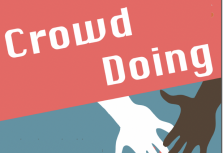
Opportunity Details
Nature Counter by CrowdDoing Senior React Native Developor (visual guide)CrowdDoing has found small groups of trained professionals who know about specific nature benefits. There are people who have been trained in ""Attention Restoration Theory"", ""forest bathing"", ""eco-therapy"", ""nature deficit disorder reduction"", and other related terms. This has not be turned into a universal type of knowledge for any society to adopt in a modern context of majorities of the population living in cities and suburbs. CrowdDoing’s goal with Nature Counter is to create universal usable knowledge about what the benefits of nature dose are, how to access the benefits of nature dose and how to validate nature dose benefits for yourself. A world with more advanced processes to support nature dose could be more convivial, more resilient,would have faster learners and greater upward mobility among a plethora of benefits. Calculate the benefits to the health care system of their getting nature dose
CrowdDoing.world, https://www.linkedin.com/showcase/74278432/
Our nature counter application gets people an expectation of benefit proportionately. We have a partially finished android and iphone app in gitab aiming at an MVP, and plans for a V2 partially developed. The app is not on the market yet.
People who live in cities and the communities that connect them can achieve goals through increasing their nature dose. There is a user-centered design gap in nature in culture in that it is not discussed in terms of its benefits. Exercise may have an obvious connection to health but the fact that people sitting on a park bench are experiencing a scientifically established public health benefit is not universally understood. Scientists have been explaining this to other researchers but it hasn’t become universal knowledge any country in the world.
1. React native (front end)
- Mobile and Android app/iOS app development
2. Redux
- Mobile and Android app/iOS app development
- saving all the local data in Redux (local storage)
- for state management
- for example, articles fetched from DB can be accessed in other pages by saving the state in Redux
3. Mongo DB and nodeJS and mongoose (for making connections between Mongo DB and nodeJS) - for backend
Geo-fencing ""React Native, Google Maps, or the API geofencing call. "" advisor Ben on geo-fencing
Languages required- React native, redux, nodejs, mongodb
Gitlab, slack
21.2.1.0 is not complete. 2.0 is the main version that needs lots of help for schools to use, companies to use, health insurers to use, game companies to use etc.
22.2.Individuals and organizations can get the level of mental health, physical health and performance benefits they seek. The aim is to quantify the dose of nature benefits required to achieve individual and collective goals.
22.3.Key Features (functions/performance it must perform/provide)
Nature dose validation through GPS of time in park
Nature dose validation from user input of symptoms
Nature dose validation and estimation from literature review and meta analysis of benefits
Nature dose education
Nature dose habit building
Nature dose social use case for families and companies and communities.
22.4.Specification (if known)
22.4.1.Platform (i.e. Windows, Mac, Linux, Unix):
Languages required- React native, redux, nodejs, mongodb
Nature Counter API-
Nature Counter individuals can aggregate data to a family, company, college, or other affiliation group through Nature Counter API.
Currently below modules are working fine:
Goal Setting,
Article
Daily Log Symptoms
Daily Manual / timer time entry
Nature Counter Project installation document.
Nature Counter Installation Process- https://docs.google.com/document/d/1QnDIU3AVPV7qCPQDnw7x7a2urwdhOpwq/edit?usp=sharing&ouid=103143249500573981174&rtpof=true&sd=true
User Profile, Goal history and user benefit section is missing.
Currently we are working on benefits section as data is placeholder data.
Non-placeholder data- https://docs.google.com/document/d/1k-bZtWg2NnlVeVaFkIYqWpqz4v7uAY5PNjnlLy6tOvY/edit?usp=sharing
We started with firebase but may need an alternative for larger usage
Mainly iphone, android, apple watch, desktop use case is more moodle and growth hackng at the beginning
Languages required- React native, redux, nodejs, mongodb, gitlab, slack
Senior React Native Developer Needed
- Experienced React-Native developer to build cross-platform app for both iOS and Android platforms.
- Knowledgeable of modern JavaScript (including ES6 syntax), HTTP, and Rest API development.
- Able to utilize and debug third party dependencies.
- Able to build smooth UI and extend current functionality of existing code base.
- Experience with mobile application architecture.
- Aid in the development of end to end app design and CI/CD processes.
- Strong team player with focus on collaborative effort; a willingness to share knowledge and communicate across teams is vital.
Developor is for Nature Counter:
Nature Counter./Biophelia Counter
""A recent study of 20,000 people published in the journal Scientific Reports finds that people who spend at least 120 minutes per week - that’s about 18 minutes a day - in nature are far more likely to report being in good health and having higher psychological well-being, as compared to those who don’t embrace nature. People who spent some time in nature, but fewer than 120 minutes a week, ""were no more likely to report good health or high well-being than those who reported 0 minutes,"" the study authors found.""
https://www.marketwatch.com/story/this-is-the-exact-number-of-minutes-to-spend-in-nature-each-week-for-better-health-2019-06-21
You can see benefits of time in the park put on Nature Counter's linkedin page here- https://www.linkedin.com/posts/nature-counter-by-crowddoing_forestbathing-naturedose-attentionrestorationtheory-activity-6805531019593302016-1hnd, You can see more background on our Nature Counter team here- https://www.linkedin.com/posts/nature-counter-by-crowddoing_forestbathing-naturedose-attentionrestorationtheory-activity-6805531019593302016-1hnd. You can see a post about how just 30 minutes a week in nature reduces the chance of depression by 7%.
https://www.nytimes.com/2019/06/13/health/nature-outdoors-health.html
120 Minutes per week in nature is also geo-locateable on phones. Have you gotten your 120 minutes a week at medium edose nature, or 90 minutes a day of high dose nature?
That is determinable by if your smart phone shows you in the park for how many minutes.
We aim to build an app that counts how many minutes in nature each week you have spent and reporting that back to the person. This is like step counts, but based on time in nature as walks through non-parks don’t count for the nature counter.
- Participate in weekly discussions across teams and stakeholders on ways to reach project goals.
Time-based nature benefits-
15 Minutes in Nature
Decrease in pulse rate by 3.9%
Decrease in systolic blood pressure by 1.9%
Decrease in diastolic blood pressure by 2.1%
Lower levels of cortisol (stress hormone)
Increased parasympathetic nerve activity and decreased sympathetic nerve activity. The sympathetic and parasympathetic nervous systems work together to control respiration, digestion, and heart rate. When you are calm, the parasympathetic nervous system is increased, lowering your heart rate and respiration, and increasing digestion. In a stressful situation, the fight or flight (sympathetic) response is triggered, dilating pupils, increasing heart rate and respiration, which allows you to breathe faster.
Feel more relaxed, yet energized
30 minutes in nature
All of the benefits from 15 minutes in nature AND
Increased attention span
Reduction in depression symptoms by 7%
Reduction in high blood pressure by 9%
50 minutes in nature
All of the benefits from 15, 30, and 40 minutes in nature AND
An increased attention span with the ability to block out irrelevant stimuli and concentrate
A decreased level of anxiety
120 minutes (2 hours) in nature
All of the benefits from 15, 30, 40, and 50 minutes in nature AND
An overall sense of well-being and happiness
A better, more restful sleep
150 minutes (2.5 hours) in nature
All of the benefits from 15, 30, 40, 50, and 120 minutes in nature AND
Reduction in feelings of anxiety
Reduced need to ruminate on past events and focus on the future
200 minutes in nature
All of the benefits from 15, 30, 40, 50, and 120 minutes in nature AND
The feeling of well-being and happiness
Nature benefits we're communicating:
Performance on backwards digit-span (a cognitively demanding task that requires directed attention/requires the person to block out irrelevant stimuli and focus) significantly improved while walking in nature Maintain the focus staring at something on paper better during and after a walk in nature. The ability to focus was not only recuperated by nature, but was even better compared to before going out into nature. A faster and more stable pattern of responding on the Attention Network Task Cognitive performance especially for self-perceived affect was found to improve significantly more after nature interactions compared to urban interactions. Overall, BDS ( backwards digit span) performance improved on average by 0.75 (SD = 2.11) points from pre- to post-nature interactions and 0.29 (SD = 2.19) BDS points from pre- to post urban environment interactions. Reduce the population prevalence of depression and high blood pressure by up to 7% and 9% respectively. A lower rates of depression and of high blood pressure. 3.9% decrease in pulse rate. Systolic blood pressure was lower (1.9% decrease). Diastolic blood pressure was lower (2.1% decrease). good reported health and high subjective wellbeing lower concentrations of cortisol, lower pulse rate, lower blood pressure, greater parasympathetic nerve activity, and lower sympathetic nerve activity walking leads to improved psychological state, reduced state-anxiety and perceived stress
The only way CrowdDoing.world can realize its impact potential is through virtual volunteers,service learners(http://blog.reframeit.com/service-learning-and-skilled-volunteering/), and micro-leaders (https://real-leaders.com/leveraging-micro-leadership-to-make-aspirational-goals-achievable/) coming together.
See this brief video aboutMicro-leadership at CrowdDoing (https://www.youtube.com/watch?v=mhdB2YJ8Ocs&app=desktop). Micro-leadership means that each person adopts a dimension of responsibility for a collective problem in our society through collaborating on that area creatively individually and together through social innovation.
You are also welcome to see more background on CrowdDoing at our Youtube Channel (https://www.youtube.com/channel/UCVoL7fai7oa95fBo44FC0gA?sub_confirmation=1).
Instagram (https://www.instagram.com/crowddoing.world/),
Facebook (https://www.facebook.com/CrowdDoing-515295062320613) ,
LinkedIn (https://www.linkedin.com/company/18910309/).
You can see a CrowdDoing Volunteering FAQ here.
https://docs.google.com/document/d/1zCkbEQX8PHh8k85BS0iIhsJJxADqdH3Kpn1PDbI1Uno/edit?usp=sharing
If you have any questions about processes for joining crowddoing as a volunteer please write to volunteerorientation@crowddoing.world
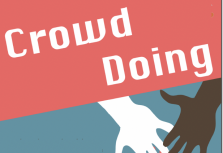
Opportunity Details
Junior Instructional Design Volunteer at Nature Counter at CrowdDoing.worldYou can see an example form nature counter instructional design team here-
The content is available at: https://rise.articulate.com/share/e-r4NQVdVlXQznLcT3Z0UZHWOeBjrF-0"".
We're now working on a moodle version in that team and are planning on an Udemy version as well. Nature Counter Linkedin- https://www.linkedin.com/showcase/74278432/
CrowdDoing LMS- https://learn.crowddoing.world/
More about Nature Counter at a project level is at the bottom of this post.
Role Summary:
We are looking for an aspiring Instructional Designer to design and develop learning and practicing experiences. Are you passionate about learning new skills and teaching others? Then this role is for you.
Essential Tasks:
Designs and develops learning programs in accordance to CrowdDoing's Service Learning model.
The Junior Instructional Designer will work in consultation with the Learning and Development Lead or Senior Instructional Designers to initiate, develop, implement and evaluate CrowdDoing’s learning initiatives.
Assess training needs through surveys, interviews with volunteers, focus groups, or consultation with Learning and Development lead or Sr. Instructional Designers.
Design, plan, organize, or direct orientation and training programs for volunteers.
Obtain, organize, or develop training procedure manuals, guides, or course materials, such as handouts or visual materials.
Partners and collaborates with other departments to pilot or implement initiatives that require learning professional support.
Skills & Competencies:
Sincere commitment to work collaborating with all constituent groups, volunteers, donors, program participants, and other supporters.
Receptive to feedback and is able to work upon areas of opportunity for improvement.
Actively looks for ways to learn and improve output.
Comfortable working in a startup phase non-profit organization.
Skills:
Learning Strategies , Instructing, Active Listening,Coordination,Critical Thinking , Judgment and Decision Making, Monitoring Social Perceptiveness, Writing, Persuasion Time Management , Complex Problem Solving, Service Orientation, Systems Analysis, Systems Evaluation, Operations Analysis and Negotiation.
Working knowledge of LMS, e-learning content authoring tools, Microsoft office and google suite.
The only way CrowdDoing.world can realize its impact potential is through virtual volunteers,service learners(http://blog.reframeit.com/service-learning-and-skilled-volunteering/), and micro-leaders (https://real-leaders.com/leveraging-micro-leadership-to-make-aspirational-goals-achievable/) coming together.Micro-leadership at CrowdDoing (https://www.youtube.com/watch?v=mhdB2YJ8Ocs&app=desktop). Micro-leadership means that each person adopts a dimension of responsibility for a collective problem in our society through collaborating on that area creatively individually and together through social innovation.
Instagram (https://www.instagram.com/crowddoing.world/),
Facebook (https://www.facebook.com/CrowdDoing-515295062320613) ,
LinkedIn (https://www.linkedin.com/company/18910309/).
People who live in cities and the communities that connect them can achieve goals through increasing their nature dose. Any country can embrace a national strategy of getting its people and institutions enough time in nature for the community to thrive. This has economic dividends, social capital dividends, mental health health dividends and physical health cost savings.
CrowdDoing has found small groups of trained professionals who know about specific nature benefits. There are people who have been trained in ""Attention Restoration Theory"", ""forest bathing"", ""eco-therapy"", ""nature deficit disorder reduction"", and other related terms. This has not be turned into a universal type of knowledge for any society to adopt in a modern context of majorities of the population living in cities and suburbs. There are examples of elements of biophelia as strategy, Singapore’s Airport, Milan’s Bosco Verticale. But the parks themselves are under-utilized globally by populations compared to their impact potential in cities.
CrowdDoing’s goal with Nature Counter is to create universal usable knowledge about what the benefits of nature dose are, how to access the benefits of nature dose and how to validate nature dose benefits for yourself. A world with more advanced processes to support nature dose could be more convivial, more resilient, have greater neuro-plasticity and would have faster learners and greater upward mobility among a plethora of benefits.
There is a user-centered design gap in nature in culture in that it is not discussed in terms of its benefits. Exercise may have an obvious connection to health but the fact that people sitting on a park bench are experiencing a scientifically established public health benefit is not universally understood. Scientists have been explaining this to other researchers but it hasn’t become universal knowledge any country in the world. No country currently recommends to all people in the country a level of nature dose to achieve basic human health goals the way nutritional recommendations are made by most countries. Nature dose empirically should be at parity with nutrition as an opportunity for established health interventions to achieve public health goals through interdisciplinary cooperation and education.
National nature strategy involves:
Nature dose education for the learner.
Nature dose education for a person in a direct support role (friend, family member, teacher etc.)
Nature dose education for a person designing systems for others that need nature dose alignment- ie employers, administrators, managers, etc.
Nature dose for people who are communicating with people who have all of these roles- educating people who create culture on nature dose, etc.
Nature dose validation (app) features
Nature Flex time for employers features
Nature capacity building for educators about the benefits of nature dose (ie all teachers who could host outside could receive that ) features
Nature capacity building for access gaps in medical knowledge for nature dose for nature prescriptions by doctors, pharmacists and nurses features
Increase the percentage of the country getting nature dose features to increase adoption and habit building
Calculate the benefits to the health care system of their getting nature dose
Nature dose education for storytellers, filmakers, tv show makers, ie how does the local culture establish nature dose benefits and real, empirical, and multi-dimensioal.
If you have any questions about processes for joining crowddoing as a volunteer please write to volunteerorientation@crowddoing.world or bobby@reframeit.com
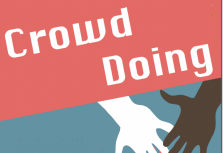
Opportunity Details
Moodle Instructional Design Volunteer at Nature Counter at CrowdDoing.worldYou can see an example form nature counter instructional design team here-
The content is available at: https://rise.articulate.com/share/e-r4NQVdVlXQznLcT3Z0UZHWOeBjrF-0"".
We're now working on a moodle version in that team and are planning on an Udemy version as well. Nature Counter Linkedin- https://www.linkedin.com/showcase/74278432/
CrowdDoing LMS- https://learn.crowddoing.world/
More about Nature Counter at a project level is at the bottom of this post.
Role Summary:
We are looking for an aspiring Instructional Designer to design and develop learning and practicing experiences. Are you passionate about learning new skills and teaching others? Then this role is for you.
Essential Tasks:
Designs and develops learning programs in accordance to CrowdDoing's Service Learning model.
The Junior Instructional Designer will work in consultation with the Learning and Development Lead or Senior Instructional Designers to initiate, develop, implement and evaluate CrowdDoing’s learning initiatives.
Assess training needs through surveys, interviews with volunteers, focus groups, or consultation with Learning and Development lead or Sr. Instructional Designers.
Design, plan, organize, or direct orientation and training programs for volunteers.
Obtain, organize, or develop training procedure manuals, guides, or course materials, such as handouts or visual materials.
Partners and collaborates with other departments to pilot or implement initiatives that require learning professional support.
Skills & Competencies:
Sincere commitment to work collaborating with all constituent groups, volunteers, donors, program participants, and other supporters.
Receptive to feedback and is able to work upon areas of opportunity for improvement.
Actively looks for ways to learn and improve output.
Comfortable working in a startup phase non-profit organization.
Skills:
Learning Strategies , Instructing, Active Listening,Coordination,Critical Thinking , Judgment and Decision Making, Monitoring Social Perceptiveness, Writing, Persuasion Time Management , Complex Problem Solving, Service Orientation, Systems Analysis, Systems Evaluation, Operations Analysis and Negotiation.
Working knowledge of LMS, e-learning content authoring tools, Microsoft office and google suite.
The only way CrowdDoing.world can realize its impact potential is through virtual volunteers,service learners(http://blog.reframeit.com/service-learning-and-skilled-volunteering/), and micro-leaders (https://real-leaders.com/leveraging-micro-leadership-to-make-aspirational-goals-achievable/) coming together.Micro-leadership at CrowdDoing (https://www.youtube.com/watch?v=mhdB2YJ8Ocs&app=desktop). Micro-leadership means that each person adopts a dimension of responsibility for a collective problem in our society through collaborating on that area creatively individually and together through social innovation.
Instagram (https://www.instagram.com/crowddoing.world/),
Facebook (https://www.facebook.com/CrowdDoing-515295062320613) ,
LinkedIn (https://www.linkedin.com/company/18910309/).
Moodle Instructional Design Volunteer at Nature Counter at CrowdDoing.world
People who live in cities and the communities that connect them can achieve goals through increasing their nature dose. Any country can embrace a national strategy of getting its people and institutions enough time in nature for the community to thrive. This has economic dividends, social capital dividends, mental health health dividends and physical health cost savings.
CrowdDoing has found small groups of trained professionals who know about specific nature benefits. There are people who have been trained in ""Attention Restoration Theory"", ""forest bathing"", ""eco-therapy"", ""nature deficit disorder reduction"", and other related terms. This has not be turned into a universal type of knowledge for any society to adopt in a modern context of majorities of the population living in cities and suburbs. There are examples of elements of biophelia as strategy, Singapore’s Airport, Milan’s Bosco Verticale. But the parks themselves are under-utilized globally by populations compared to their impact potential in cities.
CrowdDoing’s goal with Nature Counter is to create universal usable knowledge about what the benefits of nature dose are, how to access the benefits of nature dose and how to validate nature dose benefits for yourself. A world with more advanced processes to support nature dose could be more convivial, more resilient, have greater neuro-plasticity and would have faster learners and greater upward mobility among a plethora of benefits.
There is a user-centered design gap in nature in culture in that it is not discussed in terms of its benefits. Exercise may have an obvious connection to health but the fact that people sitting on a park bench are experiencing a scientifically established public health benefit is not universally understood. Scientists have been explaining this to other researchers but it hasn’t become universal knowledge any country in the world. No country currently recommends to all people in the country a level of nature dose to achieve basic human health goals the way nutritional recommendations are made by most countries. Nature dose empirically should be at parity with nutrition as an opportunity for established health interventions to achieve public health goals through interdisciplinary cooperation and education.
National nature strategy involves:
Nature dose education for the learner.
Nature dose education for a person in a direct support role (friend, family member, teacher etc.)
Nature dose education for a person designing systems for others that need nature dose alignment- ie employers, administrators, managers, etc.
Nature dose for people who are communicating with people who have all of these roles- educating people who create culture on nature dose, etc.
Nature dose validation (app) features
Nature Flex time for employers features
Nature capacity building for educators about the benefits of nature dose (ie all teachers who could host outside could receive that ) features
Nature capacity building for access gaps in medical knowledge for nature dose for nature prescriptions by doctors, pharmacists and nurses features
Increase the percentage of the country getting nature dose features to increase adoption and habit building
Calculate the benefits to the health care system of their getting nature dose
Nature dose education for storytellers, filmakers, tv show makers, ie how does the local culture establish nature dose benefits and real, empirical, and multi-dimensioal.
If you have any questions about processes for joining crowddoing as a volunteer please write to volunteerorientation@crowddoing.world or bobby@reframeit.com
